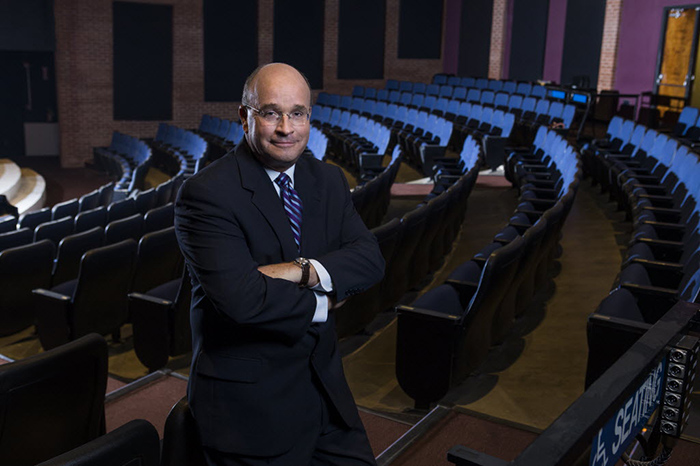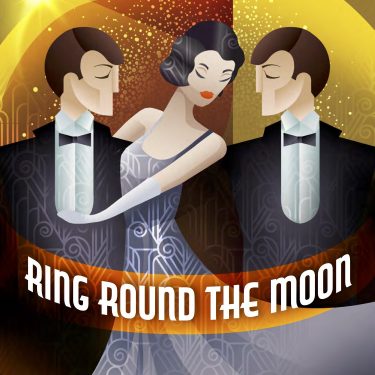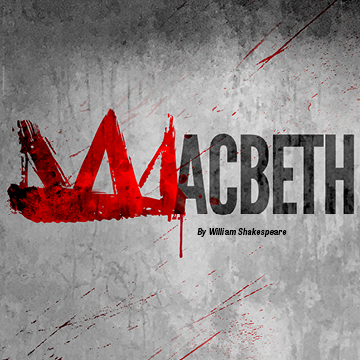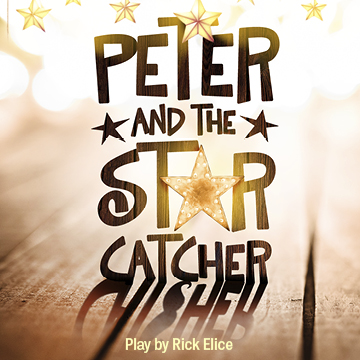
By Lana Sweeten-Shults
GCU News Bureau
According to Shakespeare, “The play’s the thing.”
And so it is at Grand Canyon University’s Ethington Theatre, which not only will dabble in a tragic must by The Bard – “Macbeth” – but a 1920s high-society comedy, a recent Tony Award-winner that tells the origin story of Peter Pan, a sobering Holocaust drama and the high-voltage, feel-good, high-energy, season-ending musical “Godspell.”
It will be a busy few weeks for the theatre department as it rehearses, builds sets, makes costumes and the like for the first play of the season. Around the same time, the department will be moving out of Colter and the Media Arts Complex to its new home in the old Colangelo College of Business Building.
College of Fine Arts and Production Dean Claude Pensis said of the theatre’s modus operandi when it comes to constructing its season, “We do Shakespeare or a classical work every season. Best we can, we try to find modern works and we try to mix it up. We will do a musical every year (in 2017-18 it was “Anything Goes”), and within there, we try to mix comedy and tragedy.
“‘Ring Round the Moon’ is most definitely a comedy.”
“Ring Round the Moon”
Aug. 24-26 and Aug. 31-Sept. 2

The theatre department didn’t waste any time casting the first stage production of 2018-19, which is under the direction of Michael Kary. Producers chose the cast before the spring 2017-18 semester ended, and rehearsals have been underway since the end of July to make sure the show is ready by the time it makes its debut Aug. 24-26, just in time for Welcome Week.
Christopher Fry adapted the dreamy, fairy tale-like 1920s-era comedy – the theatre has dubbed it “a comedic trifle of romance and love affairs” – from Jean Anouilh's 1947 play, “Invitation to the Castle.” And Fry himself saw the comedy as “a charade with music.”
It follows the aristocratic love triangle between two identical twin brothers, the shy and sensitive Frederic and his seemingly heartless and aggressive brother, Hugo. Frederic aims to marry an heiress, though she is in love with Hugo. Hugo knows the marriage will be a disaster, so he decides to rectify all things by hiring a beautiful ballet dancer to catch Frederic’s eye at the ball. But all goes awry when the ballet dancer falls for Hugo, too.
Costume Designer Nola Yergen and Assistant Costume Designer Sarah Levinson, who recently brought home Best in Show awards from Costume-Con, are putting together sumptuous 1920s Belle Epoch costumes for the comedy. The play happens to mention a popular 1920s-era design house, Callot Soeurs (the Callot Sisters).
The high-society dresses of the era: “They’re very drooly,” Yergen said. “We’re pretty excited about it.”
The parody examines the relationship between love and wealth and, like fairy tells are apt to do, aims for a happy ending.
“Macbeth”
Oct. 12-14 and Oct. 19-21
If there’s any play that’s far away in temperament from “Ring Round the Moon,” it’s Shakespeare’s tragedy, “Macbeth.”
It’s the tale of a heroic Scottish general who, after hearing a prophecy from a trio of witches declaring he will one day become king, becomes consumed by ambition and is pushed by his wife to “screw (his) courage to the sticking place” – and to murder.

“It is a tragedy, and it’s really one of his most remarkable plays,” Pensis said, adding how the department will focus on the theme of how power corrupts and absolute power corrupts absolutely. “It’s a very complex, very fascinating play.”
While Shakespeare set “Macbeth” in the Middle Ages, GCU will try something a little different.
“We’re going to modernize it, to a degree, and the setting itself is going to, visually, be somewhat neo-Byzantine," Pensis said. "What that means is, I’ve been hunting like crazy to find a period that kind of made sense. What we discovered is the fact that one designer kind of took the sort of mosaic sort of artwork you would see in Byzantine and turn that into fashion.
“The thing that’s kind of cool about the fashion aspect of it is, it’s all very young looking, which I think is going to be very, very helpful for a collegiate production and how to make it speak to your specific audience. I think this will go a long way in doing that."
“Peter and the Starcatcher”
Nov. 16-18 and Nov. 23-25
One of the new entries on Broadway in recent years has been Tony Award-winning “Peter and the Starcatcher,” which Rick Elice based on the 2004 novel “Peter and the Starcatchers” by humor columnist Dave Barry and Ridley Pearson.
“It’s related, obviously, to Peter Pan. It’s a pretty new work, and it’s a lot of fun,” Pensis said.

The play, with music, imagines how a miserable orphan rises to become the fun-loving, adventurous boy who refuses to grow up. It lends backstories to not just the title character but Tinker Bell, Hook and Mrs. Darling.
“The major producer for that is Disney. It’s really more youthful and aimed toward kids,” Pensis said.
“Who Will Carry the Word?”
Feb. 8-10 and Feb. 15-17
The theatre department will then do a hard turn away from that bit of Neverland escapism by bringing to the stage “Who Will Carry the Word?”
“It is definitely a serious play – a Holocaust drama,” Pensis said.
The drama is based on the account of Charlotte Delbo, who was part of the French Resistance and was sent to Auschwitz-Birkenau in 1942, where she was imprisoned for three years. The play tells the stories of a group of female prisoners, their friendships and the horrific circumstances in which they find themselves, from starvation to the unimaginable deaths of babies to the rats.
The title stems from the goal of these women – for one of them to survive so they can share what they lived through with the world.
“Godspell”
March 22-24 and March 29-31
Capping the season will be the classic bright, shining, hopeful and upbeat 1970s musical “Godspell.” It is the first major musical by Grammy and Academy Award winner Stephen Schwartz of “Wicked” fame with a book by playwright John Michael Tebelak.
Unlike most plays, which follow the trek of one story from beginning to end, “Godspell” groups together several Bible parables, mostly from the Gospel of Matthew. The vignettes are told by an energetic ensemble whose personalities play a big part in giving the musical life.
Some of the parables told: the Pharisee and the Sinner, the Good Samaritan, the Prodigal Son and the story of the rich man and the harvest, to name a few.
The musical’s best known number is “Day by Day,” though its varied score, which ranges from pop to vaudeville, also includes “All Good Gifts,” “Prepare Ye the Way of the Lord” and “Learn Your Lessons Well.”
Play performances for all the works in the five-play season are at 7:30 p.m. Fridays and Saturdays and 2 p.m. Sundays at Ethington Theatre.
Season tickets are on sale and are $48 per person. Single ticket prices are $12 for adults; $10 for senior citizens age 55 and older, GCU employees, GCU alumni and military; and $5 for children. GCU students are admitted free.
For information, call the box office at 602-639-8880 or email the Ethington Box Office.
You can reach GCU senior writer Lana Sweeten-Shults at [email protected] or at 602-639-7901.
****
Related content:
GCU Today: Common thread for designers: Winning Costume-Con
GCU Today: 'Major' coup: Ethington cast's performances spot-on
GCU Today: Rare elsewhere, chaplains are an Ethington Theatre tradition



































































